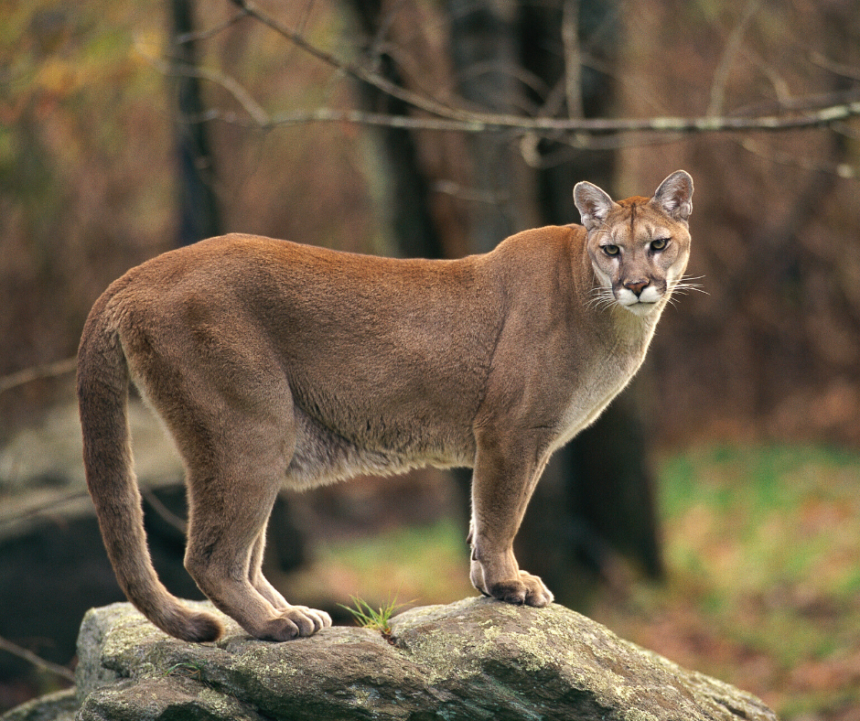Sheep farmer and part-time moonshiner Tom Sparks knew something wasn’t right that afternoon in 1920 as he walked in the woods behind his home. His flock responded nervously. They fidgeted and stayed close together. The last time they’d acted this way, a bear had been nearby, so Sparks examined his surroundings carefully. Moments later something pounced from behind … a large cougar weighing nearly 200 pounds and standing over six feet tall on its hindquarters. It lunged at his neck. Sparks unsheathed his knife and blindly stabbed over his left shoulder. As fate would have it, he landed two stabs and the animal ran away into what would someday become the Great Smokey Mountains.
Four years later, another man Mr. W. Orr killed a cougar just 20 miles from Spark’s cabin. When Sparks heard, he brought over his knife and matched it to the scar on the animal’s left shoulder blade. It was the same animal. And with that, the last Eastern Cougar in Tennessee was dead … or so the legend goes.
For the past 100 years, many southerners have repeated and believed a version of this story. But others claim, the smart, elusive animals never left. The truth, as always, is probably somewhere in between.
Is it really a cougar?
Though native to our state, hunters in the early 1900’s nearly hunted Eastern Cougars into extinction in Tennessee. Food supplies were short and so were populations of the cougar’s favorite meal, the white-tail deer. But according to the Tennessee Wildlife Resource Agency (TWRA), there have been 10 confirmed cougar sightings in West Tennessee in the past four years. The rumors of the animals roaming East Tennessee and Middle Tennessee have persisted, but those “sightings” have never been confirmed.
Local vet Wendy Wade Morton posted a trail cam photo from her Flat Creek home just last week, that strongly resembles a cougar. It didn’t take long for multiple folks to chime in that they’d spotted one too.
But that’s unlikely according to Joy Sweaney, a TWRA wildlife biologist we spoke with.
“Folk think they see them a lot, but nine times out of 10 it’s something else” she says. “We haven’t had a confirmed sighting in Tennessee since 2016.”
According to Sweaney, there was a rash of sightings beginning in 2015 that began in Obion County in West Tennessee and ended in Wayne County in 2016.
“That’s the closest we’ve been able to confirm that they’ve gotten to southern, middle Tennessee. Whether it was one cougar that was moving around or several, we can’t confirm,” she said.
According to state wildlife officials, there are basically three sub-species of cougar: Eastern Cougars (which are thought to be extinct), Western Cougars, and the Florida Panther. Many posit that Western Cougars, which have been known to travel for thousands of miles are migrating east. They also think some Florida panthers may be heading north.
“In 2015, a hunter also illegally shot and killed a cougar with an arrow in Carroll County,” Sweaney says. “We were able to confirm via DNA that that cougar came from South Dakota. Males don’t share territory, so one will travel a very long way looking to establish his own domain.”
Until recently, it was also perfectly legal to own a pet cougar. In fact, you could walk right into a pet store and purchase a cougar kitten. But in 1980, the state started requiring permits for the animals, and some believe the surging population could be from animals who were set free.
There’s no cougar hunting season
In their fall Hunting and Trapping Guide, the TWRA states, “There is evidence cougars and alligators are expanding their territories into Tennessee. Species expanding their ranges into Tennessee are protected and may not be taken until a hunting season is proclaimed. Alligators and cougars are protected by state laws in Tennessee.”
That’s right. It’s illegal to hunt, trap, or kill a cougar in Tennessee unless your life is at imminent risk. This protection, plus the surging population of white-tail deer combine for an ideal opportunity for a cougar resurgence.
They’re often mistaken for a bobcat, the only other large cat known to live in the state, but there are a couple of key differences. One, bobcats are much smaller. A typical bobcat weighs just 40-50 pounds, where a male cougar can weigh up to 200 pounds. Bobcats have pointed ears with tuffs. A cougar’s ears are more rounded. The biggest indicator; however, is the tale. A bobcats tail is … well bobbed … rarely extending more than four to five inches. A cougar boasts a long, thick tail that can be as long as three feet.
So what should you do if you see one in the wild? One, keep your distance, say wildlife officials, but don’t run. Stand your ground, maintain eye contact, and make as much noise as possible. Also, if you can do so without turning your back on the animal, pick up any children or small pets that are with you … as the animal may be zeroing in on them as prey.
You should also report the sighting to the TWRA’s closest regional office, so they can investigate. For Moore County, that’s the Region II, District 22 office located in Nashville. You may reach them by phone at 615-781-6622. For more information about cougars in Tennessee, check out the TWRA’s Cougars in Tennessee page. •
{The Lynchburg Times is an independently owned and operated newspaper that publishes new stories every morning. Covering Metro Moore County government, Jack Daniel’s Distillery, Nearest Green Distillery, Tims Ford State Park, Motlow State Community College, Moore County High School, Moore County Middle School, Lynchburg Elementary, Raider Sports, plus regional and state news.}

